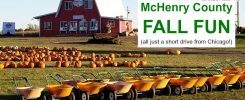(Disclosure: I am an Illinois Farm Families Ambassador. All thoughts are my own other than italicized writing which is that of the farmers.)
When it’s cold out I want to do nothing but stay inside. Driving out to my mom’s house I pass fields and I’ve always wondered what Farmers did during the winter. I pictured them relaxing for a few months a year and thought that must be a nice job. I decided to chat with a farmer and finally get all my questions answered. Donna Jeschke and her husband own a farm in Mazon, IL where they grow corn and soybeans.
Question 1: Do farmers take winters off (or any portion of the winter or another season)? If not, what do they do during the winter?
Donna’s Answer: Dec, Jan, and Feb seem to be as busy as the planting, growing and harvesting season! It is during this time when we are finalizing agronomic plans for the next crop. This includes deciding which varieties of seed corn and seed beans will be planted in which fields. We review yield results from the previous fall, as well as, study the latest soil test from each field to help make these decisions.We are also doing maintenance and making repairs on the machinery we used to harvest the crop in the fall as well as on the machines we will use to plant the upcoming crop. During this time, we also may decide to trade in older machines for more undated equipment. This year we purchased a new machine to apply nitrogen to the corn fields this spring. The liquid applicator came disassembled so my husband, brother and nephew have been working in our shop this winter to put it together. During the winter we spend about 30 days hauling the corn and beans that are stored in bins on the farm to the grain elevator or terminal facility that we sold them to. In our area, that could be a facility on the Illinois River in Morris, to one of our local coops that loads cargo containers for export, to a processor in the Chicagoland area, or to a agricultural grain company who rails corn and soybeans to livestock markets in the southeastern US or the southwestern US. Also during these three months, we attend various conferences and seminars where we learn about new agricultural technologies and equipment. These meetings help us to become better farmers by learning from other farmers, industry professionals and university researchers.
AND, the most fun is that we try to spend a day, or part of a day, each week with our 2 granddaughters! They live about 50 miles from us.
Question #2: How do you deal with the cold while working on the farm?
Donna’s Answer: We just put on more clothes if we have to be hauling grain or working on other outside activities! On the days that are below 0 degrees, we are working in the shop (which is heated) or in the farm office(that’s in the house). Those days are good to catch up on bookwork!
Question #3: How and why do you choose specific seed types and varieties?
Donna’s Answer: We made all of our seed variety and purchases in December. We decide to plant certain varieties based on how they yielded previously on our farm, our neighbors’ farms or in variety seed plots in Illinois. We meet with several seed salespeople who sell the different products and listen to their suggestions for our specific types of soils and agronomic needs. This can be a whole blog if you want to dig deeper.
Question #4: How far in advance do you plan for the next year’s crop?
Donna’s Answer: We begin planning for the next crop year as we are planting the present crop. What I mean is we may see a situation, such as the way a particular corn variety germinates in April, and decide to plant or not to plant that variety again. We “evaluate” constantly what we are doing, why we do it and how it is working. Our actual purchasing of seed is done in the Nov-Dec months for the following year.
Question #5: Has the extreme cold and record snow we’ve been having this winter effected your work at all?
Donna’s Answer: The record winter cold and snow has not affected us too much except that my husband has moved a lot more snow in the farmyard so we can move grain trucks in and out more easily. The piles if snow around here are pretty high! We also have used more LP to keep the shop warm enough to work…that’s around 50 degrees. I guess the house heating bill was higher too :)
Learn more about the Jeschke’s farm here. What other questions do you have for the Illinois Farm Families?





















